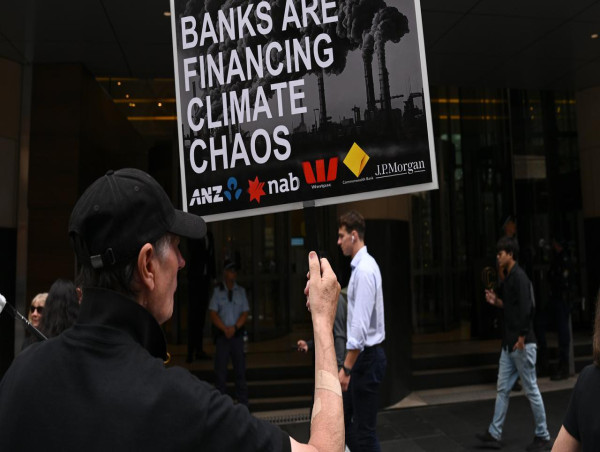Climate protesters have attempted to crash a banking summit where executives of the country's biggest banks have been spruiking their decarbonisation agendas.
Activists, including survivors of natural disasters, chanted and held banners calling out the big four banks' continued funding of fossil fuel projects on Tuesday, after the Australian Financial Review Business Summit cancelled their tickets.
Lismore resident Naomi Shine was forced to flee her house last year when it was submerged by floodwaters that engulfed the town.
The 48-year-old told AAP she was at the rally because she is horrified that fossil fuel projects continue to grow while the effects of climate change are being felt by her community.
"We need to reduce emissions now, it's just way beyond time," she said.
Ms Shine was set to attend the summit, but her ticket - along with at least four other protesters - was cancelled at the last minute by organiser AFR.
New analysis from environmental advocacy group Market Forces reveals Australia's big four banks made over two times more in fees from financing new fossil fuel projects than they gave in relief for climate-related disasters last year.
"It's clear the big four banks are putting fossil fuel companies and their own profits ahead of everyday Australians battling the increasing impacts of climate disasters," said Market Forces acting executive director Will van de Pol.
ANZ, NAB, Commonwealth Bank and Westpac, made over $30 million in financing fees for companies building new fossil fuel projects, whilst providing $13.6 million to natural disaster relief.
NAB head of institutional banking David Gall told the AFR summit it is difficult to explain the concept of fossil fuel transition.
"The way many stakeholders look at it is very binary," he said
Mr Gall said it's an inconvenient truth that banks need to transition to clean financing and can't just turn off the tap for fossil fuels.
UN chief Antonio Guterres last week urged developed countries to achieve net-zero emissions a decade earlier than most have promised.
The latest Intergovernmental Panel on Climate Change (IPCC) report showed emissions are continuing to rise and fossil fuels are attracting public and private investment that dwarfs what is spent to mitigate climate change.
Mr Gall said the government's safeguard mechanism will be important to achieving emissions reduction targets, especially for hard-to-abate sectors, but hopes carbon credits won't be necessary to achieve net-zero by 2050.
He cautioned integrity and trust in the carbon credit system will be vital to its success.



